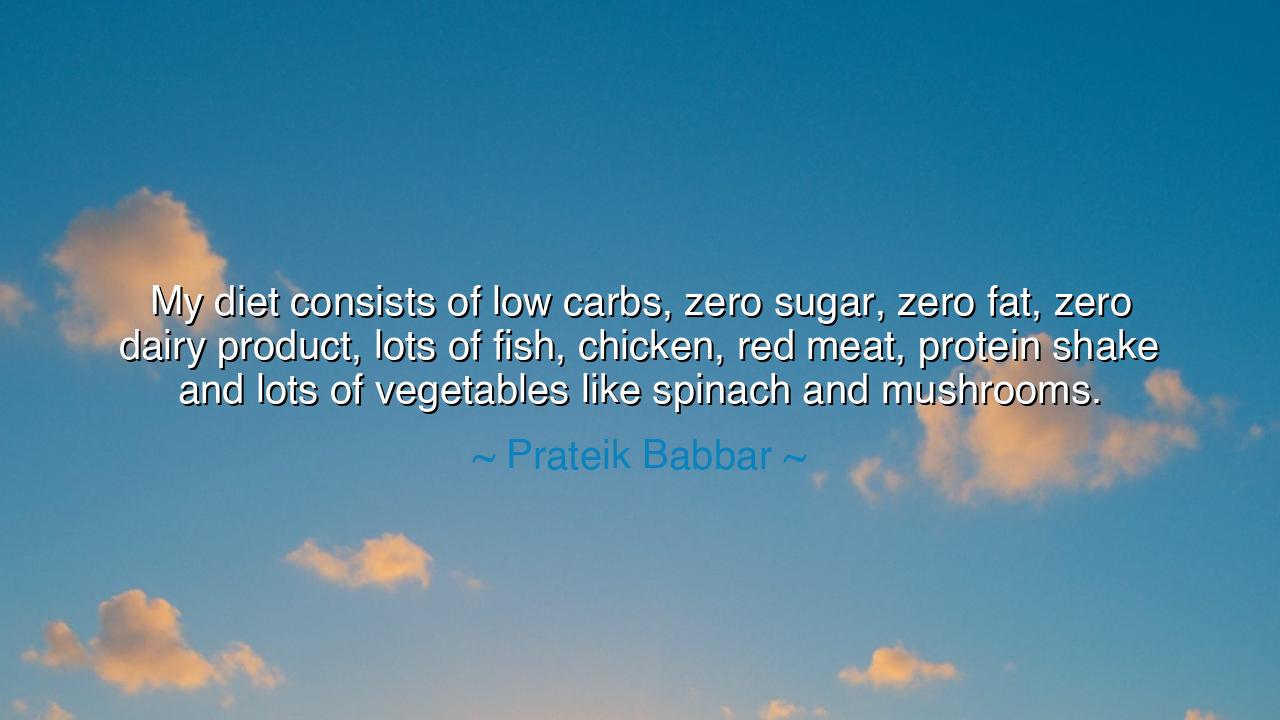
My diet consists of low carbs, zero sugar, zero fat, zero dairy
My diet consists of low carbs, zero sugar, zero fat, zero dairy product, lots of fish, chicken, red meat, protein shake and lots of vegetables like spinach and mushrooms.






When Prateik Babbar declared, “My diet consists of low carbs, zero sugar, zero fat, zero dairy product, lots of fish, chicken, red meat, protein shake and lots of vegetables like spinach and mushrooms,” he was not merely describing a menu — he was revealing a philosophy of discipline, control, and purpose. His words reflect the ancient truth that the body is not a vessel of indulgence, but a temple of strength — one that must be shaped, cleansed, and maintained through conscious choice. Beneath his modern routine of low carbs and zero sugar lies a wisdom older than civilization itself: the mastery of appetite as the foundation of greatness.
The ancients revered such discipline. In Greece, the philosopher Socrates often spoke of temperance — the art of self-restraint that grants the soul power over the flesh. The Spartan warriors, those legends of endurance and valor, lived by the same creed. Their meals were simple, their bodies honed by hunger and labor, for they believed that excess weakens the will and clouds the mind. When Prateik Babbar speaks of abstaining from fat and dairy, of choosing protein and vegetables, he echoes that timeless pursuit — the quest for purity of body, that the spirit might rise unburdened.
Yet his words also reveal the dual nature of human strength. For the path he follows — strict, unyielding, ascetic — demands not only physical endurance but mental fortitude. To live without sugar, to shun the soft pleasures of taste, is to wage war against one’s own desires. The ancients called this battle enkrateia — mastery over the self. It is not an easy conquest, for the enemy lies within: the whispering mind that seeks comfort, the heart that hungers for ease. In choosing to live by such rules, Babbar joins a lineage of warriors and monks, of athletes and thinkers, who sought greatness not through indulgence, but through discipline and denial.
Consider the story of Milo of Croton, the legendary Greek athlete. Each day he lifted a young calf upon his shoulders, and as the calf grew into a bull, so too did Milo’s strength. His diet was one of simplicity and precision, crafted to sustain his growing power. But it was not the food itself that made him mighty — it was his devotion to structure, his refusal to waver from his path. In the same way, Prateik Babbar’s strict regimen is more than physical; it is a testament to consistency, to the belief that strength is earned one choice at a time. For in the end, the diet is not the goal — it is the discipline behind it that shapes the warrior.
But there is also humility within his declaration. The mention of spinach and mushrooms — humble foods of the earth — reminds us that power need not come from luxury, but from simplicity. The earth provides all that is needed for vitality and health. The wise understand that it is not abundance that sustains life, but balance. Too much indulgence clouds the spirit; too little nourishment weakens it. The ancients spoke often of the “Golden Mean,” the sacred middle path between excess and deprivation. And though Babbar’s diet may seem severe, his intent aligns with this ancient wisdom: to purify the self, to remove what is harmful, and to strengthen what is essential.
Yet even in his discipline, one senses the modern burden — the desire to achieve, to perfect, to sculpt the body as a reflection of will. This too is part of the human journey: the yearning to transcend limitation. The body, when trained with awareness, becomes not a prison, but an instrument — a vessel for purpose. The protein shake, the fish, the meat — these are the building blocks of endurance, just as reflection, compassion, and patience are the nutrients of the soul. True strength, as both the ancients and Babbar teach us, comes not from one aspect alone, but from the unity of mind, body, and intention.
Let this, then, be the lesson: that what we consume is a mirror of what we value. If we feed the body with care, it becomes a worthy companion to the soul. If we feed it thoughtlessly, it becomes a burden. Each bite, each habit, each moment of choice is a chance to either dull or awaken the self. To live with discipline is to honor life itself — to see nourishment as a sacred act, and health as the foundation of purpose.
Therefore, follow the wisdom behind Babbar’s words: eat with intention, train with devotion, and live with awareness. Cast aside the temptations that weaken the will, and fill yourself instead with the strength of restraint. For as the ancients knew, and as every seeker of mastery learns, the path to greatness begins not with excess, but with balance, clarity, and discipline — the trinity of a body and spirit in perfect harmony.






AAdministratorAdministrator
Welcome, honored guests. Please leave a comment, we will respond soon